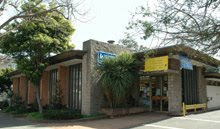 Berner vs. Briggs Collection
Berner vs. Briggs CollectionA recent addition to the Hormel Center's archival collections is a box of material from the legal case of Lawrence Berner vs. John Briggs, et al. The suit was filed as a result of the November 1978 California ballot Proposition 6, which sought to prohibit openly GLBT persons from teaching. Prop. 6 was based on the belief that GLBT school teachers are not suitable role models for children and on the fear of inappropriate conduct towards their students.
State senator John Briggs sponsored the proposition, which became commonly known as the "Briggs Initiative." In addition to Briggs, Prop. 6 was supported by Anita Bryant and the organization Save Our Children. Bryant had recently experienced success in mobilizing an anti-gay rights movement in Miami-Dade County, Florida.
Lawrence Berner, a gay school teacher in the Healdsburg, California school system, was singled out by Briggs and became a rallying point for the "No on 6" campaign. Due to significant political mobilization by Gwen Craig, Tom Ammiano, Harvey Milk, Hank Wilson, Bill Kraus, Sally Gearhart, and many GLBT community members, the proposition did not pass in California. The "No on 6" campaign was also supported by political heavyweights Ronald Reagan, Gerald Ford and Jimmy Carter.

After the proposition was defeated, Berner sued John Briggs, Save Our Children, Lee Lee (the president of the Healdsburg Public School Board) and 99 anonymous defendants listed as "Does 1-99." Berner filed the suit in 1979 and he won in 1982.
This collection focuses on the lawsuit and contains documents and exhibits regarding the pertinent events of 1978. It includes depositions by John Briggs and several other key figures in the Prop. 6 story. Of special note are scientific articles and doctors' testimony used in support of Berner's suit. Doctors David Kessler and Ernest van den Haag were the primary expert witnesses regarding the then-current scientific thought on homosexuality, children, role models, sexuality, gender identity, and pedophilia. The collection contains some correspondence with Kessler and van den Haag, as well as their depositions and copies of selected journal articles.
 Because the Berner vs. Briggs collection is a very recent acquisition and not yet organized, it is not currently available for research. Two archival collections here at the library contain related material: the Harvey Milk Archives-Scott Smith Collection and the Randy Shilts Papers. The Milk-Smith collection contains several files on the Briggs Initiative and the notes of Milk's debate with John Briggs. The Shilts Papers' Journalism series contains drafts and notes on different stories that Shilts wrote. Some of the files from 1977 concern Anita Bryant, Miami-Dade County and the repeal of the gay rights ordinance there. Later files in 1978 contain stories on Proposition 6, John Briggs, Save Our Children and the election results in San Francisco and California.
Because the Berner vs. Briggs collection is a very recent acquisition and not yet organized, it is not currently available for research. Two archival collections here at the library contain related material: the Harvey Milk Archives-Scott Smith Collection and the Randy Shilts Papers. The Milk-Smith collection contains several files on the Briggs Initiative and the notes of Milk's debate with John Briggs. The Shilts Papers' Journalism series contains drafts and notes on different stories that Shilts wrote. Some of the files from 1977 concern Anita Bryant, Miami-Dade County and the repeal of the gay rights ordinance there. Later files in 1978 contain stories on Proposition 6, John Briggs, Save Our Children and the election results in San Francisco and California.All Hormel Center archives are handled through the San Francisco History Center, 6th floor, Main Library. For questions, please contact the San Francisco History Center reference desk at 415-557-4567.

























 Because the Operation Concern collection is a very recent acquisition and not yet organized, it is not currently available for research. All Hormel Center archives are handled through the San Francisco History Center, 6th floor, Main Library. For questions, please contact the San Francisco History Center reference desk at 415-557-4567.
Because the Operation Concern collection is a very recent acquisition and not yet organized, it is not currently available for research. All Hormel Center archives are handled through the San Francisco History Center, 6th floor, Main Library. For questions, please contact the San Francisco History Center reference desk at 415-557-4567.















 "
"




